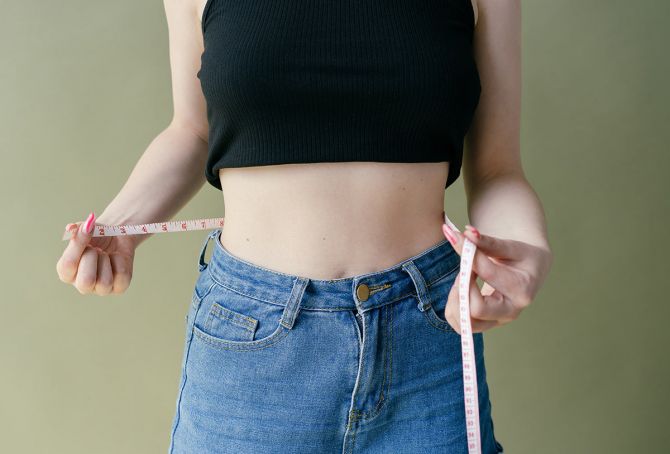When we don't get enough sleep, our bodies release a stress hormone called cortisol, which disturbs our digestive system leading to bloating and constipation, alerts celebrity nutritionist and fitness enthusiast Neha Sahaya.

Do you wake up in the morning with a huge round belly and a puffy face and see it settle down towards the second half of the day?
You might feel normal or puffy the following day as well making you wonder if you are gaining too much weight.
Trust me you are not fat, but simply bloated.
There is a huge difference between being fat and being bloated.
Fat is the accumulation of fat cells in the body caused due to excessive eating over a period of time, sedentary lifestyle, hormonal imbalance, lack of sleep and stress.
Bloating, on the other hand, is a result of accumulation of fluids or gasses inside our body.
Let's look into the reasons that cause bloating and this accumulation of fluids and glasses in our body
1. Raw food
Raw foods like salads and vegetable juices take more effort to digest.
Certain vegetables eaten raw like your cruciferous vegetables such as brussels sprouts, broccoli, cabbage, and cauliflower are known to cause excess gas.
If you cannot avoid these veggies, you can simply cook and have them.
2. Excessive salt in the diet
Bloating is temporary, but can be uncomfortable and frustrating.
The best alternative is to reduce your daily intake of salt.
Increased sodium intake in your foods can retain water in your body causing you to bloat.
Processed foods and preservatives too contain excessive salt.
By avoiding processed food from your diet, you can drastically reduce bloating.
3. Sedentary lifestyle
If you find yourself sitting at one place for prolonged periods of time, you are definitely causing water retention because of poor circulation of blood.
Moving your body every 30 minutes is extremely important for good blood circulation.
If you are working from home, try and include 150 minutes of workout in a week.
Set a simple goal of walking a few hundred steps every few hours gradually covering up to 10,000 steps each day.
4. Medication
Certain medications can cause bloating like blood pressure medicines, antidepressants and NSAIDS (painkillers) cause water retention as a side effect.
Please speak to your doctor so that they can manage you medicines in a manner to suit your current situation.
5. Poor quality sleep
It's important that we get good quality sleep for at least 7 to 8 hours in a day.
When we don't get enough sleep, our bodies release a stress hormone called cortisol, which disturbs our digestive system leading to bloating and constipation.
Poor quality sleep also causes us to crave for excessive carbohydrates, which leads us to overeat and eventually feel bloated.
Having a pinch of nutmeg or chamomile tea can help improve your sleep quality.
6. Alcohol
Alcohol can also lead to irritation of your gastrointestinal tract, which can cause bloating.
Alcohol is an inflammatory substance, meaning it tends to cause swelling in the body.
While the best option would be to avoid drinking, a healthier alternative is to stay hydrated.
So the next time you consume alcohol, remember to drink plenty of water.
In fact, drinking water with lemon squeezed during, and after drinking alcohol can help prevent its inflammatory effects on the body.
7. Dehydration
Adequate hydration is important to flush out the excess water and toxins from your body.
Dehydration makes your body hold on to more water, just like it does with fat.
Remember to keep sipping water throughout the day rather than gulping it down in one go.
Adding a few drops of lemon to your water will further help you to reduce bloating.
8. Poor diet
A diet high in carbohydrates and low in fat and protein can result in to bloating.
For every one gram of carbohydrate stored in the body (as glycogen) there is approximately 2-3 grams of water retained.
High intake of sugar and processed food can spike up blood sugar levels; our pancreas works toward bringing it down by producing more insulin.
More insulin results in more water retention.
In such cases, correcting your diet with a nutritious, wholesome meal is very important.
Add foods that are rich in magnesium, B6 and potassium to your diet.
Magnesium is a mineral responsible for carrying out 300 plus enzymatic functions including balancing sodium in your body.
Eat magnesium rich food like nuts especially almonds, seeds, banana, whole grains and avocado.
9. Vitamin B6
Low level of this vitamin may cause extra bloating especially among women during their menstrual cycle.
Food rich in potassium helps to balance and reduce excess salt.
Include fruits rich in potassium along with oats, banana, potatoes, peanuts, walnuts to your diet.
Some more quick home remedies:
- Boil 1 tbsp of jeera, ajwain, saunf in 500 ml water. Reduce it to half, strain, squeeze lime and sip this water.
- Add pre-soaked sabja in water and have it first thing in the morning on an empty stomach.
- Soak coriander seeds in a glass of water overnight and have the water first thing in the morning to reduce water retention and bloating-induced swelling.












 © 2025
© 2025